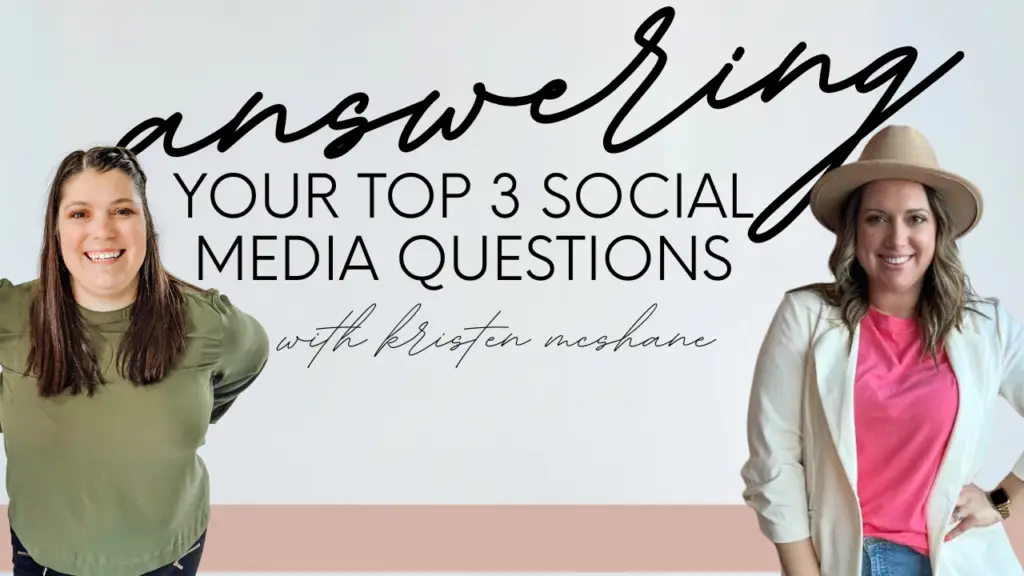Top 3 Social Media Strategy Questions Answered (With Kristen McShane of Simply Social Kristen)
Is social media overwhelming you? You’re not alone and the good news is, it doesn’t have to be complicated to be effective.
In this episode of Passion But Make It Profit, host Julia Foster is joined by Kristen McShane, founder of Simply Social Kristen, to break down the top 3 questions small business owners ask about showing up online. From how often to post to which content formats actually work, they dive into real-life social media strategy designed to work with your bandwidth — not against it.
If you’re a small business owner, solopreneur, or creative who wants to grow on Instagram or Facebook without wasting hours or chasing trends, this episode is for you.

Podcast Episode 1 Recap: Top 3 Social Media Questions Answered (With Kristen McShane of Simply Social Kristen)
If social media feels overwhelming or confusing, you’re not alone. In this episode of Passion But Make It Profit, Julia sits down with social media strategist Kristen McShane to simplify the most common questions small business owners ask about showing up online. Kristen is the founder of Simply Social Kristen and helps small business owners grow their online presence through simple, sustainable Instagram and Facebook strategies.
Whether you’re brand new to content creation or just tired of chasing algorithms, this conversation will give you a grounded, real-world approach to social media strategy that actually works.
How Often Should You Post on Social Media?
This is the question almost every small business owner asks: “How many times a week do I need to post?” Kristen’s take? It depends on your capacity. Instead of trying to keep up with what everyone else is doing, focus on how often you can consistently create quality content. For most business owners, that’s somewhere between 2 to 3 posts per week. More important than volume is value. If you can post five times a week but the content is rushed or uninspired, you’ll likely see less engagement than if you focused on one or two well-thought-out posts. Content that connects will always beat content that just fills space.
Julia adds that it’s better to become known for a smaller amount of impactful content than to blend into the background with daily posts that no one remembers. Not every business needs to post daily and many shouldn’t. When you’re ready to refine your timing and frequency, that’s when you can start looking at analytics. But if tracking best posting times is stressing you out more than it’s helping, you have permission to ignore it.
Bottom line, post as often as you can commit to creating content you’re proud of.
Reels, Static Posts, Carousels, or Stories: What Should You Be Posting?
There’s no one-size-fits-all answer and that’s kind of the point. Kristen recommends using a mix of content types, depending on your goals and comfort level:
Reels are great for reach and getting discovered by new followers
Carousels are strong for educating and keeping your audience engaged longer
Static posts are best for connection and nurturing your current audience
Stories offer a casual, behind-the-scenes way to build trust and intimacy
If you hate doing video, you don’t have to make Reels every day to succeed. If Stories feel easier and more natural, start there. The best content strategy is one you’ll actually stick to.
Julia emphasizes the importance of understanding how each platform works. On Instagram, carousels give you a second chance at reach if your audience skips the first slide, the algorithm may serve them the second one later. But on Facebook, carousels show all slides at once, so your strategy might need to shift.
Kristen encourages business owners to stop comparing their strategy to influencers or content creators who post constantly. Many of those accounts have teams or get paid for views —small businesses have a completely different goal: connection and conversion.
What Actually Matters on Social Media?
Here’s the truth: going viral is not a strategy. Kristen and Julia agree that authenticity and consistency matter more than hashtags, trends, or algorithm hacks.
As Kristen puts it, “If you’re not showing up as a real human — whether you’re the face of your brand or not — the little tactics won’t save your content.”
Going viral can even hurt your business if it attracts the wrong audience. Julia shares an example of a Reel that hit over a million views but brought very few qualified leads, compared to lower-view content that led to real sales.
If you’re a small business owner, your focus should be on speaking directly to your ideal audience. When you know who they are, what they care about, and how they talk — your content will resonate, even if it doesn’t “blow up.”
Another tip? Share your why often. If you don’t know what to post, start there. Kristen suggests revisiting your story monthly and using conversations with clients, customers, and even friends as inspiration for new content. Those real-world moments are full of messaging gold.
Want more from Kristen? You can follow her on Instagram at @simplysocialkristen or book a 1:1 Power Hour to get clear on your content strategy.
Follow Julia at @justflourishmarketing for more simple, actionable marketing tips.
This episode proves you don’t need to go viral you just need a plan that works for you.
